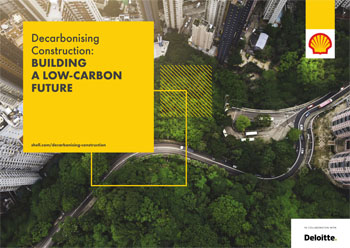Nearly 100 construction industry leaders across 84 organisations from Europe, North America and Asia contributed to the development of an industry roadmap to decarbonise the construction value chain in a new report by Shell and Deloitte, entitled Decarbonising Construction: Building the path forward.
The report argues that the most challenging aspects to decarbonise in our industry are known as embodied carbon emissions from materials, logistics and construction activities.
Together these accounted for more than 16% of global CO2 emissions in 2020 – equivalent to five times a sector like aviation – while the construction sector as a whole accounts for 37% of global carbon emissions.
Out of these big emitters, sourcing and manufacturing of materials represents 92% of embodied carbon emissions, with 43% of these attributable to cement, 25% to steel and 24% to remaining materials such as glass, aluminium, timber and asphalt, Shell’s figures state.
Embodied carbon is the natural focus for the report, which provides a value-chain assessment of the construction sector’s emissions.
The report sets out its stall by arguing that ‘most of the existing carbon reduction efforts have been focused on operational carbon’, whereas ‘creating better visibility for embodied carbon and developing solutions to reduce it will be critical’.
 It also argues that rather than focus on specific challenges or stakeholder groups in isolation, ‘given the interdependency of factors, the sector needs a more comprehensive view, which includes economic, regulatory and organisational factors’. For instance, synchronised regulations and standards for embodied carbon will create the conditions required for action, including consistency on measuring embodied carbon.
It also argues that rather than focus on specific challenges or stakeholder groups in isolation, ‘given the interdependency of factors, the sector needs a more comprehensive view, which includes economic, regulatory and organisational factors’. For instance, synchronised regulations and standards for embodied carbon will create the conditions required for action, including consistency on measuring embodied carbon.
The report presents 15 solutions that the industry needs to adopt to reach net zero (see below). These solutions should be set against the existing barriers that Shell identifies.
The ‘significant breadth and scale of technology implementation required’ and the absence of ‘established standards for data, methodologies and tools’ will be well-known to the sector. However, the report points out that there is ‘limited market and customer demand: procurement practices operate in a fragmented market which typically prioritises cost and speed over reducing embodied carbon’.
It also highlights the barrier of ‘insufficient regulatory incentives: regulations for construction sub-sectors (e.g. cement and steel manufacturing) and end markets (i.e. buildings, infrastructure and industry) are neither aligned, nor adequate to incentivise action across the value chain.’
The outlook could be described as challenging but not impossible. Shell has itself set a target to become a net-zero emissions energy business by 2050, with shorter-term goals to ensure progress along the way.
‘The consensus among those interviewed for this report is that – while challenging – the decarbonisation of the sector can be achieved. By scaling up the use of existing low-carbon solutions, developing more alternative materials and technologies, adopting supportive policies and extensively collaborating, the sector can achieve net zero.’
The good news for highways is that infrastructure construction projects are likely ‘to decarbonise soonest as they are generally publicly owned and have centralised budgets’.
‘Low-carbon cement and concrete are within the sector’s direct influence the focus should be on investment in alternative raw material inputs as carbon capture matures.’
Raman Ojha, vice president Shell Construction and Road, said: ‘There is a great willingness and desire to decarbonise and three things resonate strongly.
‘Firstly, regulations and standards for embodied carbon need to be established to incentivise faster action. Secondly, with emissions coming from construction materials representing the vast majority of embodied carbon in construction, developing low-carbon technologies and alternative materials will be key to reducing the sector’s emissions.
‘Lastly, the assets-owners must play a more active role and demand more low-carbon construction solutions in tenders. The participants to the report made it clear that although the scale and challenge of decarbonising construction is significant, it can be achieved. I am confident that with a combination of innovative solutions, supportive regulation, and more collaboration across the value chain, we can and will accelerate progress to net zero.’
Short-term (2023 – 2030) solutions
Adopt medium-term solutions as early as possible while keeping the focus on adopting all ready-now solutions.
- Increase awareness around embodied carbon
- Activate and aggregate demand
- Adopt policies to stimulate demand for low- and zero-carbon assets
- Stimulate development of low-carbon solutions through policies
- Develop and adopt alternative materials
- Roll-out low-emissions equipment
- Develop talent and increase knowledge sharing
- Make design and execution more efficient
- Update design and material standards
Medium-term (2030 – 2040) solutions
As the adoption of lower-carbon alternatives begins to expand, short-term solutions should continue to be strengthened and adopted in markets where decarbonisation is just beginning.
- Generate green financing standards and expand investment
- Invest in low-carbon cement and concrete pathways
- Scale low-carbon steel production
- Adopt more holistic contract models and public-private partnerships
- Secure supply of renewable energy and build distribution infrastructure
- Increase circularity and systems thinking
Long-term (2040 onwards) policy
Commitments and incentives should continue to evolve, and technology solutions and required infrastructure should be rolled out at larger scale as demand increases and new use cases become viable.





